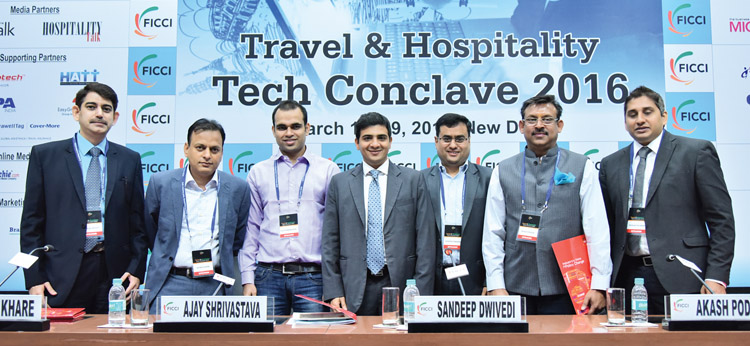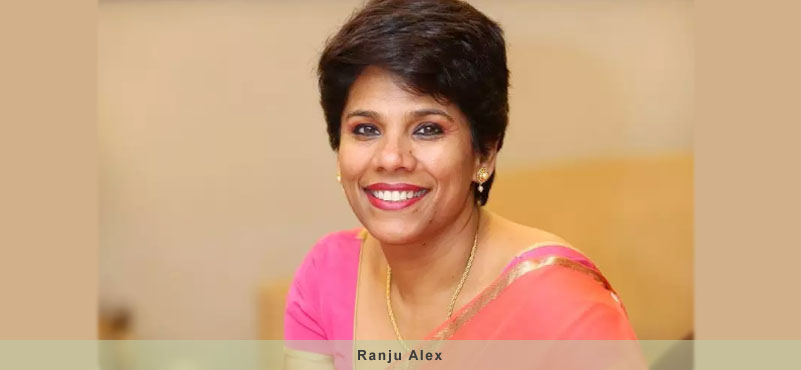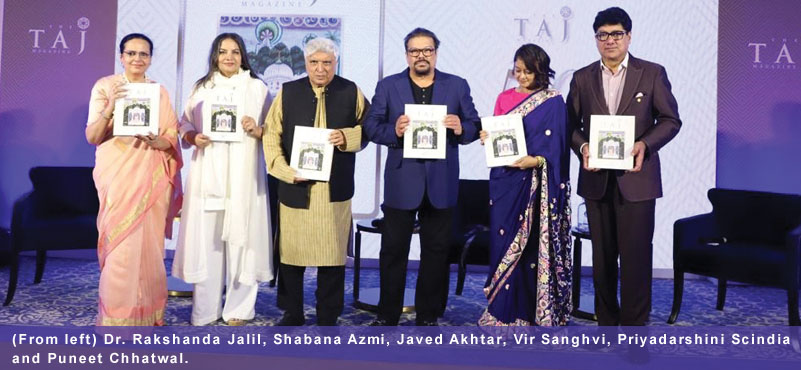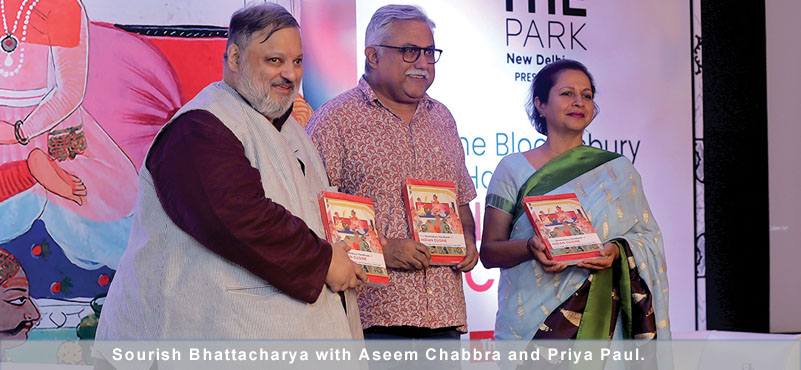Hospitality is clearly the next big frontier for players in the online booking space with the mobile emerging as the favourite tool for transaction, developing an edge over the desktop and the laptop. However, content improvement on mobile app and better collaboration between online intermediary and the actual product suppliers are some critical immediate challenges.
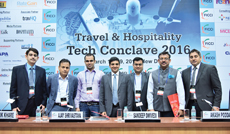 It could well be the extreme manifestation of the tectonic changes which technological leap can trigger to the hospitality business. The Henn-na Hotel, in Nagasaki, Japan, is slated to become world’s first man-less hotel when it opens its doors to welcome guests this summer. It will have robot staff (metal and silicone employees) who will speak in four languages – Chinese, Japanese, Korean and English and will take care of all those usual functions catered by a hotel unit. Initially, the hotel will deploy 10 robots staff manning different functionalities with a bare minimum human intervention. After the first few months of experiment, the manpower will be completely removed leaving the management affairs in the hands of the robots. Within the hospitality circles worldwide, the opening of this hotel is awaited with bated breath; how it eventually fares is the key point of interest. The proposed unit (result of technological experimentation for the last one decade) is broadly believed to be the counter version of smart factories which many leading industrial houses in the developed markets are toying with – units where the manufacturing process is taken care by the robot workers who can be controlled from remote locations (even from other continents).
It could well be the extreme manifestation of the tectonic changes which technological leap can trigger to the hospitality business. The Henn-na Hotel, in Nagasaki, Japan, is slated to become world’s first man-less hotel when it opens its doors to welcome guests this summer. It will have robot staff (metal and silicone employees) who will speak in four languages – Chinese, Japanese, Korean and English and will take care of all those usual functions catered by a hotel unit. Initially, the hotel will deploy 10 robots staff manning different functionalities with a bare minimum human intervention. After the first few months of experiment, the manpower will be completely removed leaving the management affairs in the hands of the robots. Within the hospitality circles worldwide, the opening of this hotel is awaited with bated breath; how it eventually fares is the key point of interest. The proposed unit (result of technological experimentation for the last one decade) is broadly believed to be the counter version of smart factories which many leading industrial houses in the developed markets are toying with – units where the manufacturing process is taken care by the robot workers who can be controlled from remote locations (even from other continents).
In a technologically advanced market like Japan, such high-end experiments are not rare. Something which can’t be aped in other markets quite readily. Nevertheless, it indicates the new dimensions which technology can add to the hospitality management. From the standpoint of the Indian hospitality business and technological shifts which are happening on the ground (as governed and directed by the changing market dynamics), their immediate challenges, however, are more basic in nature. Nevertheless, they are no less interesting given the pace at which they are happening covering diverse elements of the hospitality business – both in internal management as well as in connecting with the end-users at large. “Technology is taking over most of the activities of our life, tourism and hospitality are no exception. Internet boom and mobile applications are changing the hospitality business dramatically,” said Jyotsana Suri, Chairperson, The Lalit Hotels at the inaugural session of the Travel & Hospitality Tech Conclave recently organised by leading industry chamber FICCI in Delhi.
The event which comprised an impressive gathering of representatives from the leading tech companies as well as hospitality brought to the fore the core issue of adjustments to the technological wave which is sweeping across the Indian hospitality space. A report jointly released by FICCI and RezNext (a noted global name in the space of real-time enterprise distribution technology) presented a wider perspective in terms of emphasizing on the rapidity of the technological changes as well as furnishing of the hard numbers. For instance, online hotel booking revenues in India is likely to hit $1.8 billion in the current year even as hotels in India have yet to leverage website as their most profitable channel of sale. The report underlined that the user friendly real-time applications and robust cloud offerings have demystified technology concepts and hotel companies need to adjust to the advanced functional modalities. In addition, the business travel spend is growing at a staggering pace in the country and is expected to shoot up to $45 billion by 2019 which entails business hotels to cater to a much larger technologically advanced clientele base in the medium run. The pragmatism of adopting dynamic distribution model has also been stressed in the report in no uncertain terms.
The practitioners in the fray endorse the rapid-fire technological changes theory which has ushered in the business. “Five years ago, the OTAs were just selling hotels in a few locations. But now their hotel inventory has grown significantly,” pointed out Prashant Rao Aroor, CEO, IntelliStay Hotels. The growing influence of OTAs in hotel booking is well reflected in the fact that currently 25 percent of hotel bookings are made online of which 18 percent come through online sales platforms. Hotel booking is believed to be a more lucrative business for OTAs with assured margins of 10-15 percent which is significantly higher than what they earn out of online air booking. According to a market estimate, home-grown OTA major MakeMyTrip is presently earning 45 percent of its revenue from hotel and packages and it wants to expand the share of its non-aviation business to 70 percent in the next couple of years. “It is bound to happen. Revenues from hotel will overtake air booking in not so distant future,” confirmed Ritwik Khare, Senior VP & Head (Business Development), Hotels, MakeMyTrip. The moral of the story as a tech expert pointed out: “You are committing a major strategic mistake if you are not aligning with the leading OTAs, especially when you do not belong to a big brand stable.” “Things are changing so fast that even the term OTA appears out to be a misnomer now. If you are not aligned to the online transaction functionality, you might be living in a different age,” added Abhijit Beej Das, President & CEO, Boston East India Hotels.
But even for online masters who seem to be in a rush to expand their hospitality portfolio, delivering on every promise made to the customers is a critical challenge which need quite a fine-tuning in terms of collaboration between the supplier and the intermediary. “There are some damage instances in the online hotel booking. Going by an industry estimate, about 9 percent of hotel bookings on online platforms are not confirmed by the hotels. We have to coax them to comply but even then about 1-2 percent of bookers do not get the facility they had asked for. As volumes grow, the suppliers and intermediaries will need to collaborate more tightly,” pointed out Akash Poddar, COO, Tsi Yatra.com.
A critical churning currently underway in the online hotel booking space is the gradual shift from desktops and laptops to mobile applications for hotel bookings. According to FICCI-RezNext report, MakeMyTrip saw 53 percent of their overall domestic hotel bookings come through mobile phones in June 2015. Cleartrip has also seen tremendous growth in the mobile booking with 59 percent of its overall traffic and 46 percent of all transactions on the platform came from mobile, in Q2 2015. Yatra is estimated to be driving 30 percent of its revenue through mobile and has set a target to increase revenues from the mobile app to 50 percent in about 18 months. International channels like Expedia are also investing on their mobile strategy. As of 2015, close to 45 percent of Expedia’s business in India came from their mobile app. Even a relatively newcomer like Oyo Rooms is registering more bookings through its app now. “Our app is not more than a year old. But today it is resulting in nearly 70 percent of all hotel bookings,” informed Ajay Shrivastava, VP (Engineering), OYO rooms. The robust growth in hotel bookings through mobile app is, of course, happening on a small base and is likely to consolidate with the growing internet penetration but players in the game point to some serious hurdles which need to be fixed expeditiously. “The mobile online hotel booking segment is witnessing the first burst of growth in the country. But there are some hurdles right now. For instance, small screen is a serious challenge. Reviews, which have become so critical for customers, have not been effectively designed for mobiles. This needs immediate attention because apps help in capturing personal preference data more efficiently” Khare underlined.
Even a cursory crystal gazing for the near to medium run makes it clear that the technological wave influencing hotel business is slated to grow in intensity. Aggressive companies like Oyo Rooms which has carved a niche for itself in a very short period vis-à-vis its formidable peers believe that a larger part of the hospitality turf is still waiting to be covered. “As per our estimate, about 10 percent of the total hotel room inventory is booked online in the country. There is remaining 90 which need to be tapped. The opportunity is simply huge. Going ahead, we are also going to witness the increasing commoditization and standardization of hotels where platforms like us will also play a role,” Srivastava explained. Another trend which is likely to become prominent in the near to medium run is allowing customers to frame their own holiday packages and here the hotels will have to ensure more visibility through aggressive online presence in collaboration with the technology service providers. A surprise element could well be GDS, traditionally aligned with the airline bookings, picking up expertise in hotel bookings too. “GDS are taking steps to build strength in hotels. Their operational mechanism has been very efficient for the air booking segment with the backing of IATA. They may well emulate similar modalities for the hotel business as well,” Sandeep Dwivedi, Chief Commercial Officer, InterGlobe Technology Quotient underlined. And then the operators of the meta-search enginews too have turned their attention to the fast growing Indian hospitality market (read the box piece). Quite clearly, the technological scene in the Indian hospitality space is unlikely to have any dull moment in the coming years.
Meta-search engines will bring in the next big wave
The noted online travel agencies in India like MakeMyTrip, Yatra, Cleartrip, etc. were clearly the first bunch of baton holders of the e-tailing business which has assumed epic-scale nature now in the country with its spread covering general merchandise. The home grown OTA majors had first tagged along with the fast-growing aviation industry over the last decade and now are keen to replicate their aviation success in the hospitality segment as well. And this story has become more formidable with the global-scale OTAs like Expedia, Hotels.com, booking.com, etc. (most of them ensure more than half a million room night bookings every day globally) also increasing their presence on the Indian turf. And while all of them have a commendable portfolio of travel related products, a common string which they share is their focus on hospitality given the low online penetration in the segment. With airline booking reaching to a matured stage in terms of spread and reach, this obviously is the next big frontier for the internet companies catering to the travel space.
The business of creating the robust online connect between customers and the hotel units in the country, however, is taking one more interesting turn with the growing interest of the operators of leading meta-search engines. And going by the industry buzz, they are going to bring in the next big wave in the segment of online hotel booking. “In developed markets like the US and the European Union, for every product there is a price-comparison meta-search engine. Meta-search engine has added a unique value proposition to online booking sphere. Though there isn’t much awareness about the difference between the OTAs and meta-search engines here in India now, the scene is poised to change. We will be playing a much larger role in the Indian market in the coming years,” Paul Whiteway, Sales & Commercial Director (APAC), Skyscanner commented.
In precise terms, a meta-search engine scores over the OTA by being the virtue of acting as one-stop shop where all contents of even OTAs (those who agree to collaborate) are shared with price-comparison. Loosely referred as “aggregators’ aggregator”, the USP of the meta-search engine is that it ensures that consumers do not have to visit too many OTA sites to look for options and pricing. “A meta-search engine is much like a Policy Bazar or Bank Bazar (financial market meta-search engines popular in India) where all the contents are aggregated and he products of all leading players are placed together. India is the perfect market for meta-search in operating in the travel and hospitality space. It is very much aligned to the basic quest of the price-conscious Indian consumers,” said Ashwin Jayasankar, General Manager, Wego India.
But there is a basic distinction between the OTAs and the meta-search engines which give them independent corners to survive and thrive resulting in their collaboration. “The major issue is who earns the customers and who owns the customers? The answer is we earn the customer but if that customer prefers the offering of a specific OTA on our site, the OTA will own him. Unlike an OTA, we do not control the supply but only connect to it. It’s a win, win proposition for both us and the OTAs,” explained Nikhil Ganju, Country Head, Trip Advisor India. Trip Advisor, the global online travel review market leader, had also kickstarted meta-search offering three years ago. By the virtue of being the first and the last resort of product searching and price comparison, the business conversion rate is far ahead of the OTAs which is the major scoring point of the meta players. However, for the OTAs, meta- search engines provide one more robust platform to sell their inventory. “Since we are only engaged in connecting the buyer and the supplier, we operate differently than the OTAs. For instance, we do not need to run the call centers. We are more focused towards other innovation like providing chat services and multiple language facilitation to our visitors,” pointed out Aloke Bajpai, Co-Founder & CEO, IXIGO.
To build a gigantic content base directed to serve any specific market, it is imperative for the meta-search engine operator to collaborate with the strongly positioned OTAs there. And according to meta-search operators like Trip Advisor, the process of joining hands has begun in the Indian market. “We aren’t facing a lot of resistance here. Our model has proven global credentials and we will do well in India as well,” Nikhil asserted. “Some Indian OTAs have begun working with us in the middle-east markets and we are hopeful such alliances will be forged for the domestic Indian travel products like hospitality,” added Ashwin. According to Paul Whiteway, considering the growing popularity of the meta-search platforms globally, the stakeholders owning and operating products themselves have begun asking for their positioning. “Considering the high conversion rate, the value proposition offered by meta-search engines is too compelling. It is a profitable proposition for all partners. Globally, some noted airlines and hotel groups are strongly backing these platforms and in a fast-growing travel and hospitality market like India, the scene will eventually be no different,” underlined he.

